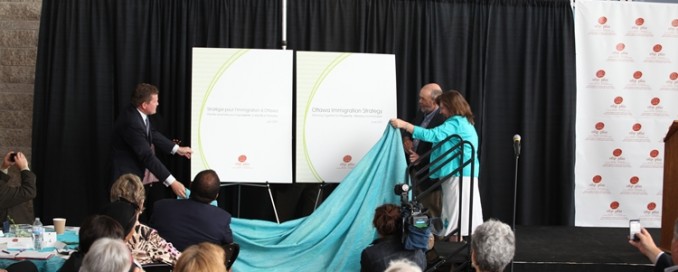What We Do
OLIP’s mandate is to build community-wide capacity to attract, settle, and integrate immigrants. This mandate is fulfilled collaboratively by OLIP partners through three activity streams: collective planning, collaborative leadership, and coordinated action.
Collective Planning
OLIP’s collective planning establishes a common vision and direction and creates and sustains inclusive and transparent mechanisms for action and course correction. A key part of this activity stream is the development of shared understanding among OLIP partners and stakeholders, as well as the articulation of shared values, guidelines, and protocols for working together. The key results of this area of work include:
- The Ottawa Immigration Strategy, which was developed collectively by OLIP partners and local stakeholders and sets long-term community direction to improve immigrants’ and newcomers’ integration outcomes while enhancing Ottawa’s prosperity and vitality.
- A flexible and supportive community-wide governance structure that provides transparent norms, protocols, and processes, which enable the effective involvement of all OLIP partners to achieve progress on the goals identified in the Ottawa Immigration Strategy.
- The Ottawa Immigration Forum, which is hosted annually by the OLIP Council, provides a space to communicate and celebrate our collective progress on the goals identified in the Ottawa Immigration Strategy, while facilitating the development and deepening of shared understanding on key aspects of immigrant settlement and integration. The Forum is also a means for OLIP partners to seek community input on planned directions and actions.
- The OLIP Open House for Immigrant Leaders is held annually and serves as a visible and predictable channel for communicating with local immigrant communities. At the Open House, OLIP partners share information on emerging opportunities, build relationships with immigrant leaders who are seen to be community connectors, and solicit input on key questions to inform planned action.
Promotion of Collaborative Leadership
This activity stream renders explicit partners’ commitment and intersecting mandates in the integration of immigrants. It also establishes joint plans that are aligned with the Ottawa Immigration Strategy. Concretely, the OLIP Secretariat works with partners individually or in groups to help them move from aspiration to concrete medium-term plans that take into consideration not only the broad community directions established in the Ottawa Immigration Strategy, but also the opportunities provided by partners’ complementary plans. New synergies and capacities are thus created through the knitting of a tapestry of mutually supportive plans that will, over time, yield sustainable collaboration to address gaps and persistent challenges.
An exemplary result of OLIP’s work in this area is the alignment of the Ottawa Immigration Strategy with the City of Ottawa, which was one of the strategy’s founding partners and a key contributor. The OLIP Secretariat worked closely with senior City staff to establish explicit City Council Terms of Priorities on the attraction and economic and social integration of immigrants. From this alignment spawned a new structure, the Municipal Immigration Network, which links action on immigrant integration across City departments, designates leadership, and facilitates a number of joint initiatives with OLIP partners. Work is underway to develop a Municipal Immigration Strategy.
Supporting Coordinated Action
This activity stream champions progress on the implementation of the Ottawa Immigration Strategy and develops concrete collaborative initiatives on the sectoral strategies contained within it. Work is undertaken by the same expert teams that developed the OIS and who now form part of the OLIP governance structure as five Sector Tables working on: 1) Economic Integration; 2) Health and Wellbeing; 3) Education; 4) Language Training and Supports; and 5) Settlement and Institutional Capacity Development.In their evolving roles, Sector leaders leverage local knowledge to identify opportunities, prioritize among competing needs, and develop collaborative initiatives that move Ottawa closer to the goals of the Ottawa Immigration Strategy.


 The target beneficiary of the work of OLIP is the whole community. In this short period we have planted together important seeds for Ottawa’s development.
The target beneficiary of the work of OLIP is the whole community. In this short period we have planted together important seeds for Ottawa’s development.